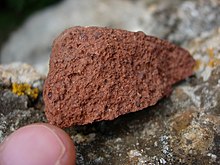Because the hub turned on a show about it tonight, and metal is an ongoing interest of mine. And because you probably have aluminum knitting needles and/or crochet hooks. So it's nearly kinda-sorta relevant.
Aluminum is the third most common element on our planet. Unfortunately, it is VERY reactive, likes to combine with other things, and is almost impossible to find in pure form. For that reason, even though it is EVERYWHERE, aluminum was, for many years, more expensive than gold or platinum. No, seriously.
Because of the reactivity, and the rarity of pure aluminum, the history is really weird.
Alum - aluminum mixed with potassium and sulfur - goes way back in our history. It was used medicinally, and as a mordant for dyeing fibers and fabrics. Still is. It's used in pickling, in preserving, all kinds of stuff. But because of all the crazy molecules it likes to form, it wasn't until the 1820s that aluminum was identified as its own little atom.
Not long after, they realized there was aluminum in bauxite:
But it wasn't until the 1880s that someone figured out a way for it to be extracted from bauxite in any useful way. So for that sixty-ish year period, aluminum was a big fucking deal.
The Washington Monument is capped with it:
Because, really, when you're building giant phallic symbols to celebrate how awesome your nation is, what else do you put on the top, but the most expensive thing you can think of? At the time, it was the largest piece of aluminum ever cast. (Given the hub's background in industry, looking at that now, I find it completely hilarious. I'd love to see their reaction to a giant hunk of milled aircraft aluminum.)
In 1886, the Hall–Héroult process was invented. It pretty much revolutionized industry methods and products. For all people like to go on about steam engines and electricity, without cheap aluminum, the world as we know it today would not exist.
In 1888, the world's first aluminum plant was opened, right here in Pittsburgh. They couldn't refine it fast enough - no matter how much they made, the world wanted more to use. And luckily for us, since it's so common, we've been able to continue refining it with no end in sight.
Not just industry. Limeys? You know this statue?
The Anteros statue in Picadilly Circus was cast from, yes, aluminum. One of the first known statues of its kind, made in 1893. Since we can just refine more, we won't have to melt it down for beer cans, like the Romans did to their statuary.
So, next time you're knitting with aluminum needles? Show them a little respect. And wish it was 1850, so you could sell them and go on a round-the-world tour with the proceeds.
Saturday, May 05, 2012
Subscribe to:
Post Comments (Atom)
















6 comments:
I teach science and the Washington Monument fact is one of the ones I like to use to get the kids to realize how much things can change from rare/expensive to everyday...look at the window frames of the class room. lol Enjoyed reading. Helen
Imagine melting that statue to make Billy Beer cans! Funny what's valuable in olden times, isn't it? And how what we value changes? I'm going to start hoarding, hmm, let's see, what can I hoard? Right now I seem to be hoarding dust bunnies and cobwebs... can't really see a market for those down the road. I'll keep thinking while I go clean the bathroom, using my treasured, aluminum Swiffer mop handle.
I once saw an add for jewelry made of "titanium, niobium and anodized aluminum"and have used it as the non-sense mantra for whenever I don't want to think about something. Just recite repeatedly. Titanium, niobium and anodized aluminum. Titanium, niobium and anodized aluminum. Titanium, niobium and anodized aluminum.
I've been making my way (slowly) through The Disappearing Spoon & I just finished the chapter on aluminum! Fascinating stuff.
Wow... what happens to the byproducts of the processing? enquiring minds want to kn ow!
You should see if you can look out the recent series by Mark Miodownik on the bbc: http://www.bbc.co.uk/programmes/b01fm490
Also there's another one on Wednesdays called something like Metals! in connection with the V&A. Not watched it yet but recorded it.
Post a Comment